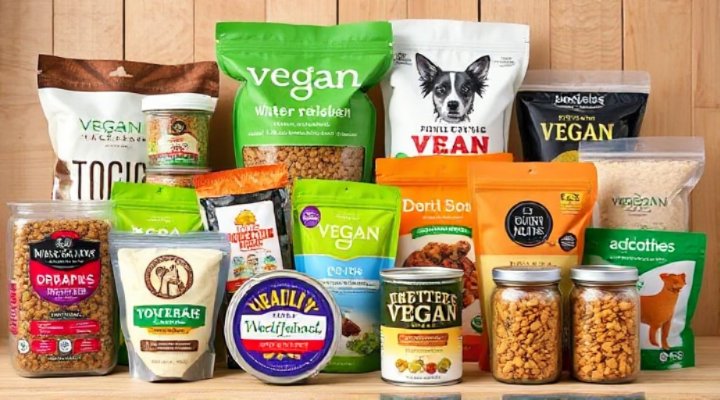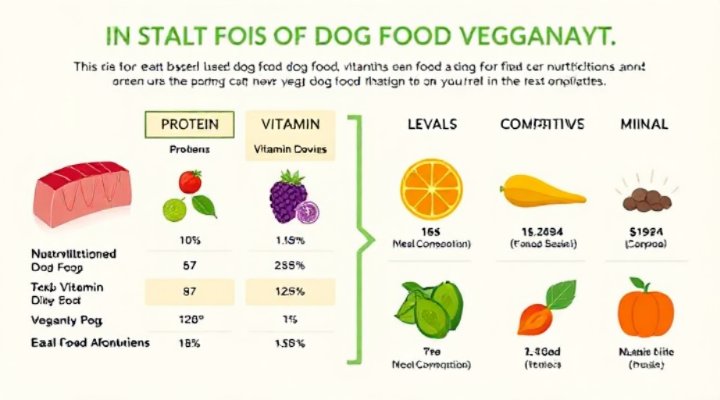In recent years, vegan dog food options and benefits have gained significant attention among pet owners seeking alternative nutrition for their canine companions. This comprehensive exploration delves into the world of plant-based dog nutrition, examining everything from commercial formulations to homemade recipes, while addressing the nutritional adequacy and health implications of these dietary choices.

Understanding Vegan Dog Food Fundamentals
Firstly, it’s crucial to recognize that dogs are technically omnivores, unlike their carnivorous wolf ancestors. Consequently, they can thrive on well-formulated plant-based diets when proper nutritional balance is maintained. That is to say, with careful planning and appropriate supplementation, vegan dog food can provide complete nutrition for most dogs.
Moreover, many pet owners choose vegan options for various reasons, including ethical concerns, environmental considerations, or addressing specific health issues like food allergies. For instance, some dogs develop sensitivities to animal proteins, making plant-based alternatives an excellent solution. Additionally, the environmental impact of traditional pet food production has led many environmentally conscious owners to seek sustainable alternatives.
Nutritional Considerations for Plant-Based Canine Diets
When considering vegan dog food options and benefits, nutritional completeness becomes paramount. Above all, certain nutrients require special attention in plant-based formulations. Protein quality, for example, must be carefully evaluated since plant proteins have different amino acid profiles than animal proteins.
Furthermore, essential nutrients like taurine, L-carnitine, vitamin B12, and certain fatty acids must be adequately supplemented. Most commercial vegan dog foods address these concerns through careful formulation and fortification. Meanwhile, homemade vegan diets require particular attention to nutritional balance, often benefiting from veterinary guidance or consultation with canine nutrition experts.

Top Commercial Vegan Dog Food Options
The market now offers numerous high-quality commercial vegan dog food options that provide complete and balanced nutrition. These products typically combine various plant protein sources like peas, lentils, chickpeas, and quinoa to create optimal amino acid profiles. Additionally, they’re fortified with essential vitamins and minerals that might be lacking in plant-based ingredients.
Some leading brands have undergone feeding trials and meet Association of American Feed Control Officials (AAFCO) standards for complete nutrition. For pet owners concerned about food allergies, these commercial options often provide excellent alternatives to traditional protein sources that might trigger sensitivities.
Homemade Vegan Dog Food Recipes
For owners preferring homemade options, creating nutritionally complete vegan meals requires careful planning. A balanced homemade vegan diet typically includes a variety of protein sources, healthy carbohydrates, essential fats, and necessary supplements. Most importantly, consultation with a veterinarian or canine nutritionist is strongly recommended before transitioning to homemade vegan food.
Common ingredients in homemade vegan dog food include lentils, chickpeas, brown rice, sweet potatoes, and various vegetables. These should be complemented with appropriate supplements to ensure nutritional adequacy. The FDA provides guidelines on pet nutrition that can help inform these decisions.

Health Benefits of Vegan Dog Food Options
The potential benefits of well-formulated vegan dog food are numerous and supported by growing scientific evidence. Many owners report improved coat condition, better digestion, and increased energy levels in their dogs after switching to plant-based diets. Additionally, some studies suggest that appropriately formulated vegan diets may help with weight management and reduce certain health risks.
For dogs with specific health conditions, vegan options can offer particular advantages. Dogs with food allergies or sensitivities to animal proteins often experience significant improvement when switched to hypoallergenic plant-based diets. Similarly, some senior dogs with kidney issues may benefit from the different protein composition in vegan foods, though veterinary guidance is essential in these cases.
Transitioning to Vegan Dog Food
Transitioning your dog to vegan food should be a gradual process to avoid digestive upset. Start by mixing small amounts of the new food with their current diet, gradually increasing the proportion over 7-10 days. During this period, closely monitor your dog’s appetite, energy levels, and stool quality.
It’s also wise to schedule a veterinary check-up before making significant dietary changes. Your vet can assess your dog’s current health status and provide personalized recommendations. Furthermore, regular follow-up visits can help ensure the new diet continues to meet your dog’s nutritional needs as they age or if their health status changes.

Addressing Common Concerns About Vegan Dog Diets
Many pet owners have legitimate concerns about vegan diets for dogs, and addressing these thoughtfully is important. The most common concern involves protein adequacy, but numerous studies have shown that dogs can thrive on properly formulated plant-based proteins. Likewise, concerns about nutrient deficiencies are addressed through careful formulation and supplementation in quality commercial products.
Another consideration involves palatability, as some dogs may initially resist new flavors. However, most commercial vegan dog foods are designed to be highly palatable, and gradual transition helps overcome initial resistance. For picky eaters, adding small amounts of vegetable broth or warming the food can enhance appeal.
Long-Term Health Monitoring
Regardless of diet choice, regular health monitoring remains essential for all dogs. For those on vegan diets, particular attention should be paid to coat quality, energy levels, weight maintenance, and overall vitality. Additionally, regular blood work can help ensure nutritional adequacy and early detection of any potential issues.
Annual veterinary check-ups become even more important when feeding alternative diets. These visits provide opportunities to assess whether the current diet continues to meet all nutritional requirements as your dog ages or if health conditions develop. The American Veterinary Medical Association offers valuable resources on canine nutrition that can guide these discussions with your veterinarian.

Environmental and Ethical Considerations
Beyond health considerations, many owners choose vegan dog food for environmental and ethical reasons. Plant-based pet food production typically has a lower environmental footprint than traditional meat-based options, requiring less land, water, and energy while producing fewer greenhouse gas emissions.
Ethically, vegan dog food aligns with values of animal welfare and reduces demand for factory-farmed animal products. For owners who follow vegan lifestyles themselves, feeding plant-based diets to their pets can create consistency in their ethical choices. However, it’s important to balance these considerations with ensuring optimal health for your canine companion.
Special Considerations for Different Life Stages
Nutritional needs vary significantly throughout a dog’s life, and vegan diets must be adjusted accordingly. Puppies, for instance, require higher protein and calorie densities for proper growth and development. Fortunately, several commercial vegan puppy foods meet these increased nutritional demands.
Senior dogs, conversely, may benefit from adjusted protein levels and additional joint support nutrients. Pregnant or nursing dogs have exceptionally high nutritional requirements that must be carefully met through specially formulated diets. In all cases, working with a veterinarian ensures that life stage nutritional needs are properly addressed through vegan options.
For those considering organic options, several vegan dog food brands offer organic formulations that combine the benefits of plant-based nutrition with organic ingredient sourcing.
Conclusion: Making Informed Choices
In conclusion, vegan dog food offers a viable nutritional alternative for many dogs when properly formulated and implemented. The key to success lies in choosing high-quality commercial products or creating carefully balanced homemade meals with professional guidance. Most importantly, regular veterinary oversight ensures that your dog’s nutritional needs are met throughout their life.
Whether motivated by health concerns, ethical considerations, or environmental awareness, exploring vegan dog food options can be a rewarding journey for both pets and their owners. By making informed choices and maintaining vigilant health monitoring, you can provide your canine companion with nutritious, sustainable meals that support their wellbeing while aligning with your values.
Related Keywords: plant-based dog nutrition, vegetarian dog diet, hypoallergenic dog food, sustainable pet food, animal protein alternatives, canine nutrition, ethical pet food, environmental pet care, dog food allergies, organic vegan dog food

